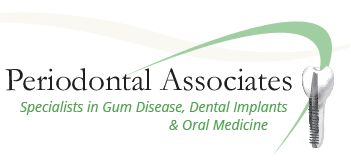The Prevalence of Gum Disease
 Gum disease, also called periodontitis, causes redness or swollen gums, bad breath, loosening teeth, and even bone loss in the jaw. All of this can increase the chances of losing your teeth. However, gum disease is not just a threat to your mouth. As recent research suggests, the same germs that cause gum disease can also get into your bloodstream and move around your body, inflicting more damage to other systems. This indicates that gum disease might be connected to other serious health problems that were previously believed to be unrelated. Not only is gum disease a serious condition that can put your overall health at risk, its occurrence is incredibly common. According to the CDC, “Nearly half (46%) of all adults aged 30 years or older show signs of gum disease; severe gum disease affects about 9% of adults.”
Gum disease, also called periodontitis, causes redness or swollen gums, bad breath, loosening teeth, and even bone loss in the jaw. All of this can increase the chances of losing your teeth. However, gum disease is not just a threat to your mouth. As recent research suggests, the same germs that cause gum disease can also get into your bloodstream and move around your body, inflicting more damage to other systems. This indicates that gum disease might be connected to other serious health problems that were previously believed to be unrelated. Not only is gum disease a serious condition that can put your overall health at risk, its occurrence is incredibly common. According to the CDC, “Nearly half (46%) of all adults aged 30 years or older show signs of gum disease; severe gum disease affects about 9% of adults.”
1. Maintain Good Habits of Oral Hygiene
Maintaining good habits of oral hygiene is not only beneficial to your teeth clean, but can keep gum disease at bay. While many people brush their teeth regularly, they do not brush their teeth as often or properly as needed to keep their oral health in tiptop shape. The amount of time and techniques of brushing applied certainly contributes to the quality of a good oral hygiene regiment. Another missed factor among many adults is the habit of daily flossing. Yes, flossing is one of the most neglected forms of oral hygiene, yet its effectiveness is equal to and in some cases greater than brushing at maintaining healthy gums. In many circumstances, flossing can clean up to an additional 40% of your tooth surface. Those who never floss will never truly know how much of their tooth surface is left to the forces of decay. On top of brushing and flossing, a good mouthwash is a must if one is to retake their oral health. Mouthwash reduces plaque and reaches areas that brushing and flossing simply can’t.
2. Regular Dental Visits
On thing you can do to ensure your gum health is where it needs to be is to receive regular dental exams. A good interval would be at least every six months, that way you can address any issues that arise before they become a serious problem. Of course, professional teeth cleanings are more thorough than regular maintenance done at home, and can remove plaque and tartar buildup which contributes to the accelerated progression of gum disease. As periodontists, Drs. Ovadia and Tanur are specialists in the evaluation and treatment of gum disease, and will develop an effective treatment plan that is right for you.
3. Eat a Balanced Diet
One aspect of gum health that is often overlooked is that of diet. While brushing, flossing and rinsing is an important aspect of oral hygiene, a diet rich in vitamins and minerals goes even further in supporting and maintaining gum health. This is because nutrition is responsible for giving the body the necessary tools to fight off the excess build up of bacteria and agents that worsen gum disease. Of course, some foods are known to be worse for your gum health than others, such as sugary and acidic foods. Staying away from these kinds of foods will enhance your fight against gum disease and keep your body supplied with the right tools to ward off the causes of tooth decay.
4. Quit Smoking
Of course, there are other external factors besides food that can produce the wrong kind of oral health that leads to gum disease. One of these major external factors is the smoking or chewing of tobacco. Because of its addictive qualities, constant exposure to substances that come into contact with teeth are really damaging to the tooth structure and overall conditions in your mouth. The acidity from the smoke and tobacco is commonly seen as one of leading causes of tooth decay. As with any addictive substance, the first step in improving your gum health is making a plan to quit.
5. Manage Overall Health
Other major health factors that can contribute to the severity of gum disease includes conditions such as diabetes. The combined issues are compounded and create worse problems when gum disease is present. It is always best to consult your healthcare provider alongside a gum disease specialist to manage these conditions. Together, the fight against gum disease is more manageable and effective.
Conclusion
In summary, there are many ways one can improve their oral health, and deter the effects of gum disease. The five strategies listed here are some of the key factors to maintaining healthy gums for life. Not only can you start applying these strategies in your daily routine, but you can also contact our office to make an appointment for a gum disease evaluation. We offer complimentary consultations to provide helpful guidance and plan effective treatments for gum disease.

